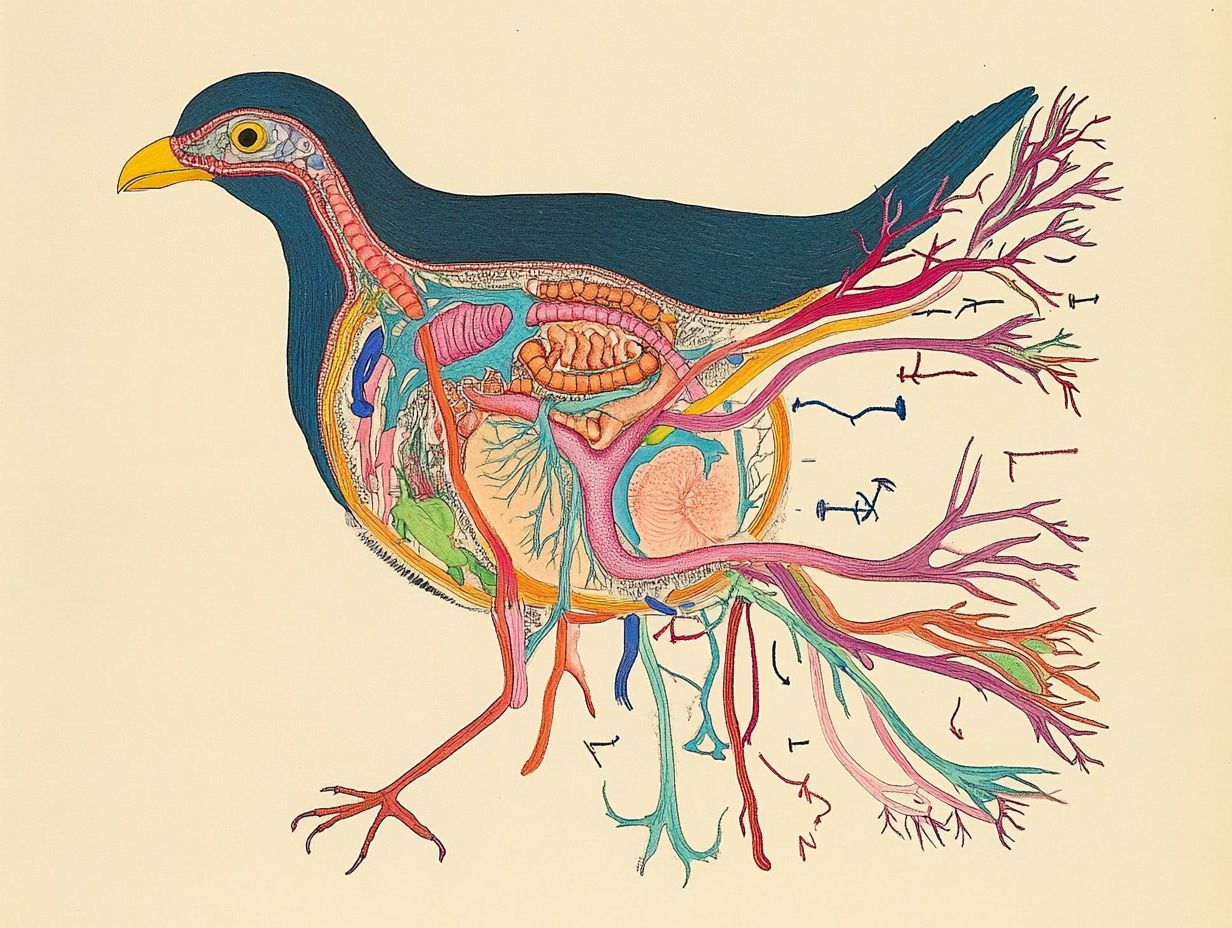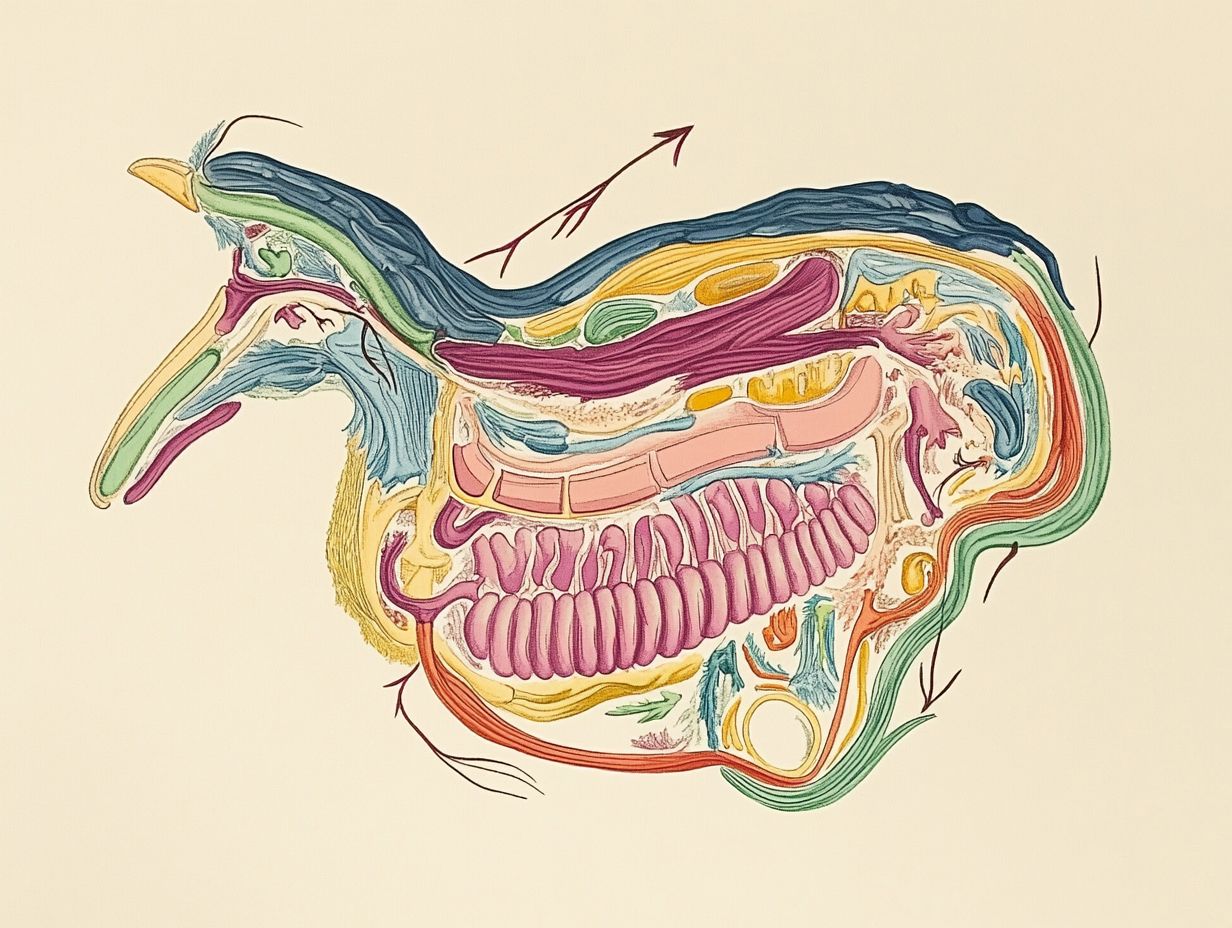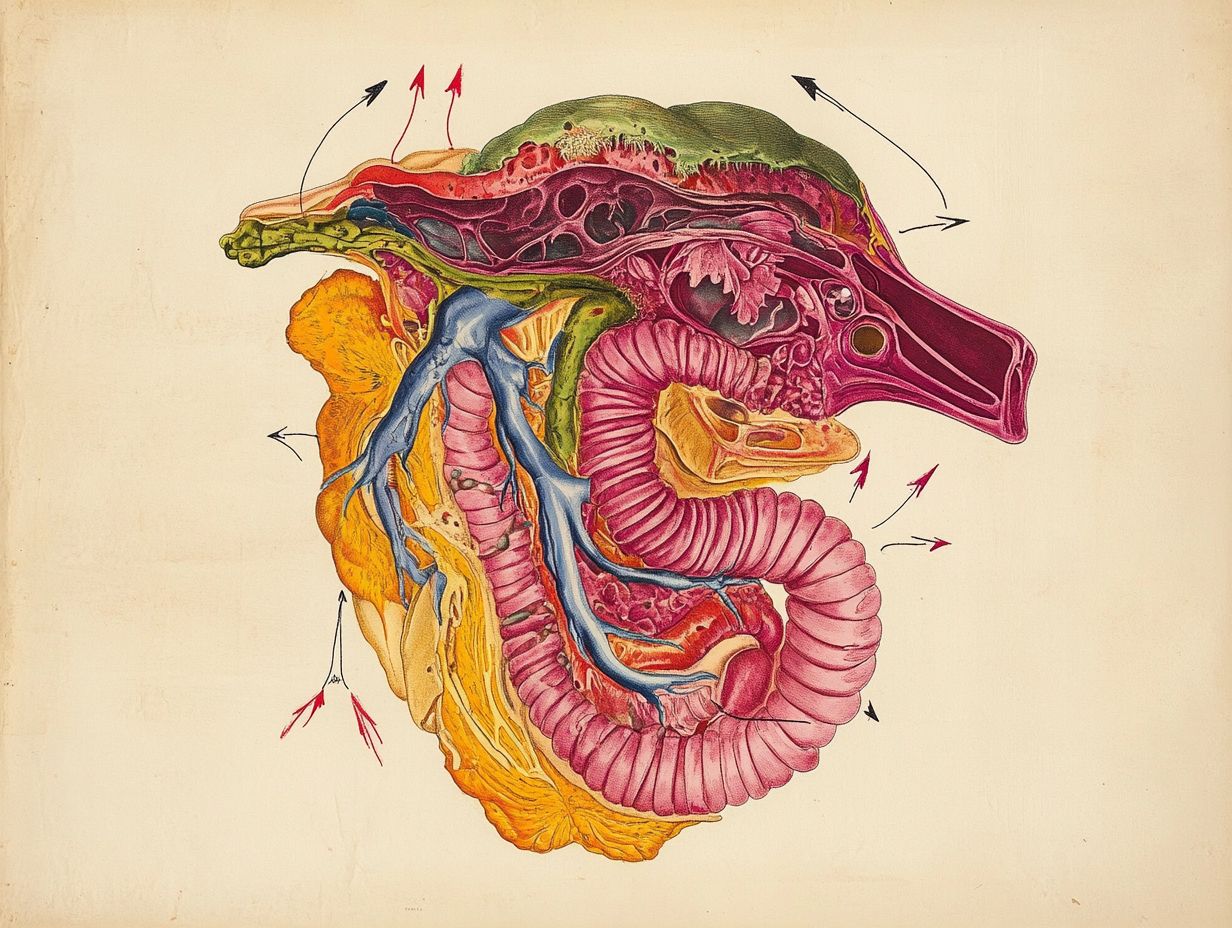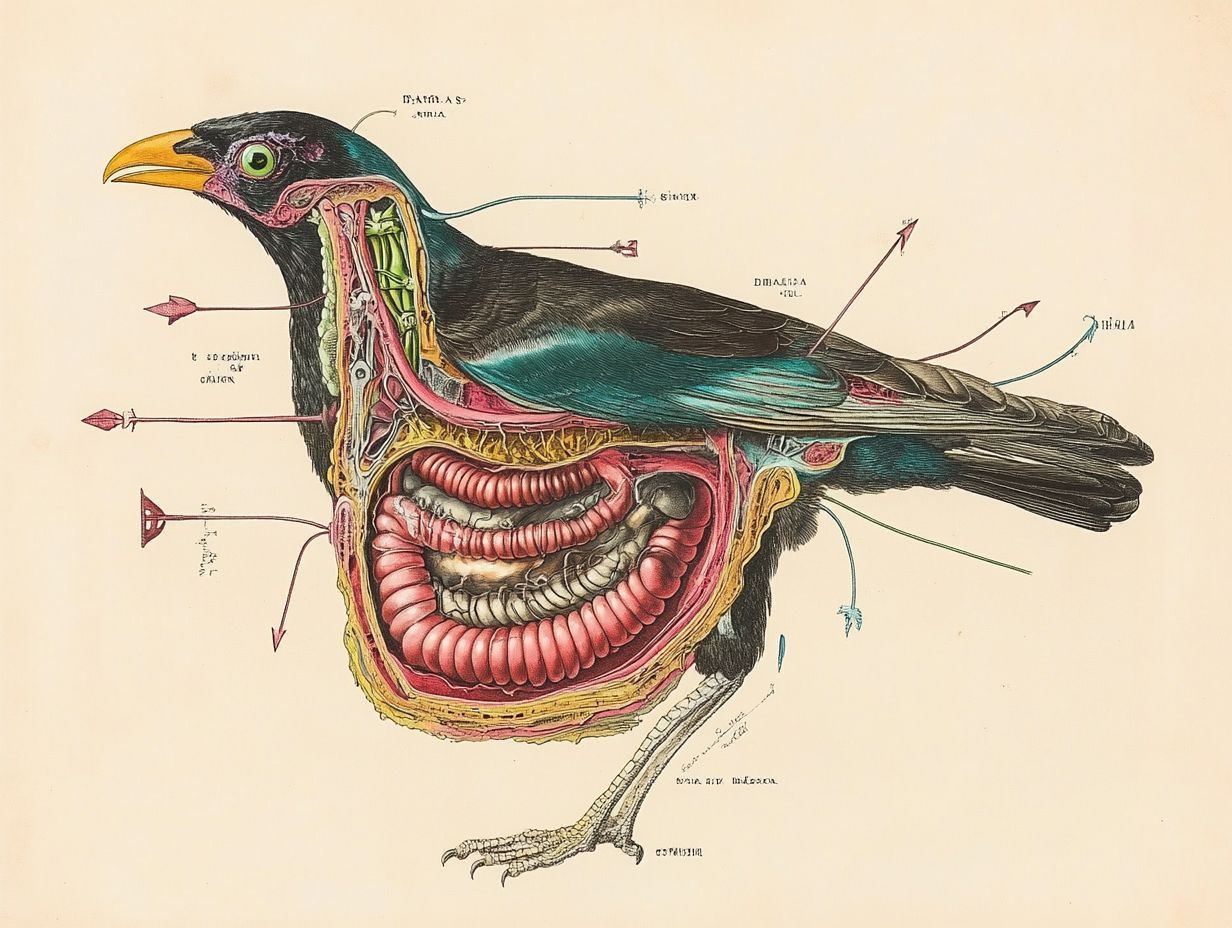Understanding Bird Digestive Health
Maintaining digestive health is paramount for the well-being of your birds. It directly impacts their overall vitality and longevity, especially during migratory flight.
Let s explore the key role of your birds’ digestive health! This article highlights common digestive issues, their causes especially those related to diet and the nutritional needs of new chicks.
Discover effective prevention strategies to ensure your feathered friends remain healthy, alongside key signs that signify a thriving digestive system and their ability to forage efficiently.
Contents
Key Takeaways:

- A healthy digestive system is crucial for a bird’s overall health and well-being.
- Identify and treat common digestive problems quickly to avoid serious health risks!
- Proper diet and good hygiene practices are key in preventing digestive issues in birds. Regular check-ups and observing signs of a healthy digestive system can also help maintain bird health.
The Importance of Digestive Health in Birds
The digestive health of birds is essential for their overall well-being. It influences their ability to forage effectively, replenish energy spent during activities, and maintain metabolic stability, particularly during vital feeding times at dawn. For more insight, check out understanding the avian digestive system.
A healthy digestive system helps birds absorb nutrients for growth and survival in diverse environments, ensuring they can replace energy spent during activities.
Role of Digestive System in Overall Health
The digestive system in birds is crucial for their health, breaking down food through specialized digestive enzymes, ensuring proper bile production in the liver, and facilitating the absorption of essential nutrients needed for energy and growth.
This intricate system starts with the crop, a pouch-like structure where food is temporarily stored. The proventriculus is where digestion begins. Here, digestive enzymes and acids break down food further, preparing it for the powerful gizzard, which mechanically grinds the material, aiding in rapid digestion. Nutrients are then absorbed through the intestines, where the body extracts vital vitamins and minerals.
The digestive system also eliminates nitrogenous waste in the form of uric acid.
Maintaining a healthy digestive system is essential for preventing digestive diseases. Any disruption in this finely tuned process can significantly impact nutrient uptake and overall well-being, which is vital for energy conservation.
Common Digestive Issues in Birds
Birds can face a range of common digestive issues affecting their ability to forage, absorb essential nutrients, and sustain their energy levels. Symptoms like lethargy, unusual droppings, and a decreased appetite can signal potential digestive diseases, underscoring the necessity for prompt treatment.
Identifying and Treating Common Problems

Identifying and addressing common digestive problems in birds requires keen observation of symptoms and an understanding of dietary factors, including those related to gallinaceous birds.
Birds often show subtle signs of distress that can indicate more significant health concerns such as changes in their eating habits, lethargy, or unusual droppings. A balanced diet is essential; it provides the vital nutrients your feathered friends need and supports their overall digestive health, particularly during feeding time.
For bird owners, closely monitoring feeding behaviors is imperative since specialized beaks can influence how birds select and consume their food. When problems arise, treatment options may include dietary adjustments tailored to the specific species and conditions. Consulting with a veterinarian can offer comprehensive care and valuable insights into your bird’s health.
Causes of Digestive Issues in Birds
Digestive issues in birds often stem from their diet. Inadequate food choices, improper feeding times, and insufficient grit can harm their health.
Paying attention to these factors helps your feathered friends thrive.
Dietary Factors and Other Causes
Dietary choices are vital for bird digestion. Poor food selections and a lack of grit can lead to serious digestive problems.
Different bird species have unique dietary needs. For instance, seed-eaters benefit from a diet rich in seeds and grains. Sugar-loving birds thrive on high-energy liquids, especially in colder months. Meat-eaters require protein from insects.
By offering a tailored diet with proper grit, you can promote the health and energy of birds, reinforcing the connection between their diet and digestion.
Preventing Digestive Issues in Birds
Preventing digestive problems is essential for birds health and longevity. You can do this by adopting best care practices and feeding them at appropriate times.
Maintain a balanced diet, provide necessary grit, and ensure clean, fresh water to support their well-being.
Best Practices for Maintaining Digestive Health

To maintain digestive health, offer a balanced diet and fresh grit while aligning feeding schedules with their natural behaviors.
A comprehensive diet that includes high-quality seeds, fresh fruits, and vegetables is crucial. For example, parrots thrive on leafy greens, while finches prefer varied seed blends.
Control portion sizes and meal timing to enhance digestion. Mimicking their natural foraging helps support their overall health.
Signs of a Healthy Digestive System in Birds
Healthy birds show several signs, such as normal droppings, consistent energy, and active foraging. These indicators mean their nutritional needs are being met.
When birds are healthy, their energy levels and overall well-being improve.
What to Look for in a Healthy Bird
When evaluating the health of a bird, you should observe signs such as bright eyes, smooth feathers, and normal feeding behaviors. These indicators reflect good digestive health and overall well-being, which are crucial for their metabolic safety.
Beyond these visible cues, a healthy bird typically exhibits an active and curious demeanor, eagerly exploring its surroundings. You might notice your feathered friend engaging in spirited play, a clear sign of vitality and a positive mindset! Regular grooming behaviors, like preening, showcase contentment and help maintain feather quality. Feather quality is essential for insulation and flight.
However, be attentive to any behavioral changes, such as sudden lethargy or shifts in appetite. These can indicate digestive distress. It’s wise to take a closer look at their diet and any environmental stressors that might be impacting their overall health, as these can affect their digestive enzymes and liver health.
Frequently Asked Questions
What is bird digestive health?

Bird digestive health refers to the overall health and functioning of a bird’s digestive system, including the esophagus, crop, and gizzard. It encompasses the ability to properly digest and absorb nutrients from food, as well as to prevent digestive issues such as blockages or infections. For more information, consider understanding the role of probiotics for birds in supporting this vital aspect of their well-being.
Why is understanding bird digestive health important?
Understanding bird digestive health is essential for the overall health and well-being of birds, particularly for chickens and similar birds that rely on their digestive tract for proper nutrient absorption. A healthy digestive system ensures proper digestion and absorption of nutrients, which is crucial for growth, development, and overall energy levels. It also helps prevent digestive issues that can lead to serious health problems.
What are some common digestive issues in birds?
Some common digestive issues in birds include crop impaction, bacterial or fungal infections, and liver or kidney disease, often exacerbated by improper food choices. These issues can be caused by factors such as improper diet, stress, or exposure to toxins.
How can I maintain good digestive health in my pet bird, including considerations for energy conservation and nutritional needs?
To maintain good digestive health in your pet bird, it is important to provide a balanced and nutritious diet, avoid sudden changes in diet, and regularly clean and disinfect food and water bowls. It is also important to monitor your bird’s eating habits! Seek veterinary care if you notice any changes or signs of digestive issues.
What are some signs of poor digestive health in birds, and how do they relate to their digestive system?
Signs of poor digestive health in birds may include changes in appetite or eating habits, weight loss, abnormal droppings, vomiting, or regurgitation. It’s crucial to seek veterinary care if you notice any of these signs, as they may indicate a digestive issue.
Can stress affect a bird’s digestive health, particularly during migratory flight?
Yes, stress can negatively impact a bird’s digestive health. When birds are stressed, their immune system may weaken, making them more susceptible to digestive issues and infections. It’s vital to provide a calm and comfortable environment to help maintain their digestive health.
For more tips on bird care, explore our resources!






